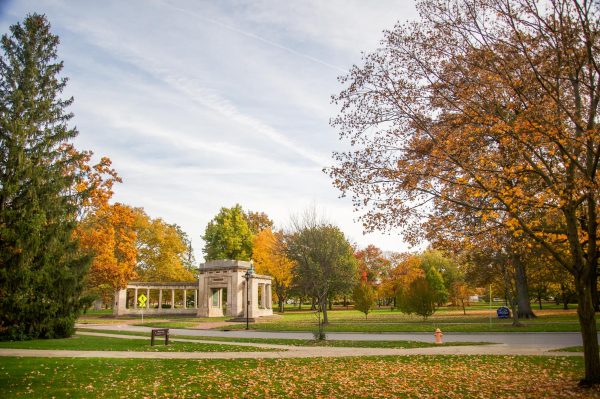Bernie Sanders: The 2020 Candidate Nobody Asked For
The 2020 presidential election cycle has officially begun, with upwards of ten candidates already declaring their bids for the Democratic nomination. This deep pool includes current U.S. senators, entrepreneurs, local-level politicians, and more.
Newer faces of the Democratic Party, such as Senators Kamala Harris and Cory Booker, have managed to generate much excitement, asserting themselves as candidates to be taken seriously despite claiming little name recognition. However, they’ll soon be tested by progressive powerhouse Sen. Bernie Sanders of Vermont, who announced his second presidential bid last Tuesday.
Emerging into a majority of the public’s eye only a few years ago, Sanders positioned himself as Hillary Clinton’s competition for the Democratic nomination during the 2016 primary election. An Independent, Sanders ran on what, at the time, were considered radical stances, such as Medicare for All, free public college, and an increased national minimum wage, among others.
He overwhelmingly secured the millennial vote, though he still came up short during the primaries and eventually lost the nomination to Clinton. Since then, Sanders’ philosophies have been adopted by many politicians — particularly a younger, further left-leaning crop of Democrats.
Initially, the idea of a Bernie 2020 candidacy might seem apt and inevitable. However, this second-chance bid for the Presidency is ill-conceived, unnecessary, and might even cost Democrats the White House.
It should go without saying that this upcoming election will be crucial for all of America, but specifically for marginalized people. It’d be an understatement to say that Donald Trump’s actions and popularized rhetoric have affected the lives of vulnerable groups in extremely negative ways.
His travel ban singling out majority-Muslim countries, the nomination and eventual confirmation of Brett Kavanaugh to the Supreme Court, and family separation policy are all examples of tangible changes Trump has been able to make while in office. The year 2020 is, and has to be, about who has the best shot at removing Donald Trump from the White House — specifically for the sake and survival of marginalized folks within and outside of the United States. Sanders simply isn’t a viable candidate for this task.
As he’s become increasingly popular, Sanders’ ideas have become more and more mainstream, though he still lacks the support of establishment Democrats. His image as a self-proclaimed revolutionary doesn’t appeal to centrists and moderates. It’s going to take a unified Democratic voting bloc — potentially with support from some moderate Republicans — to ensure Trump’s loss in 2020. Sanders’ image and a number of his policies make him unattractive in this way.
Sanders also struggled — and failed — to gain the support of older voters and Black voters alike in 2016. Looking at Sanders’ performance in key primary states, some might say that he’s got a tight hold on white working-class voters. However, upon more recent reflection, many journalists today would even say that more specifically, his base is white millennials.
“Because young voters also tend to have lower incomes, the massive age gap between Sanders and Clinton has sometimes looked to observers like a gap in economic class, according to political scientists Matt Grossmann and Alan Abramowitz,” wrote Vox’s Jeff Stein. “But the most salient divide in the primary is not between rich and poor. It’s between young and old — and between black and white.”
There are other ghosts of the 2016 campaign that will continue to haunt Sanders. Despite fighting for Civil Rights during his college years, Sanders dismissed Black Lives Matter activists who called for him to address the one-year anniversary of the murder of Michael Brown at a Seattle campaign rally; he later came out in support of All Lives Matter movement. He’s since thrown his support toward the Black Lives Matter movement, though the move feels too little, too late.
Sanders also only recently issued an apology regarding accusations of sexual harassment during the 2016 election cycle made against his former staffers, another late-in-the-game step toward addressing a shortcoming. In a primary campaign that already pits Sanders against two Black candidates and six women, these facts from his past will surely make him ill-favored among some.
Sanders works well in the Senate. There, he doesn’t need the overall support of the Democratic Party to enact change. Acting as a voice for a new generation of Democrats, he’s able to influence and shape politics in a way that others may not, pushing his colleagues further left and challenging his establishment peers.
Sanders doesn’t need the White House — this he’s made clear. The unlikely rise of freshman Rep. Alexandria Ocasio-Cortez can largely be credited to a change in thinking sparked by the ideas put forward by Sanders in 2016. Even some current Democratic presidential candidates are pushing for many of the ideas Sanders popularized.
Despite the excitement generated by many of Sanders’ policies, and the impact that he’s had on re-centering the Democratic Party, 2020 needs to be about one thing and one thing only: defeating Trump. This is going to require a lot, but first and foremost, it’s going to require uniting the Democrats, which is something Sanders has proven he’s unable to do.




